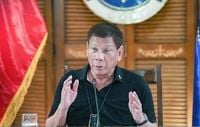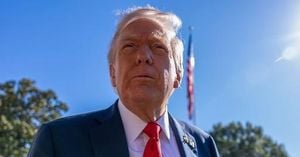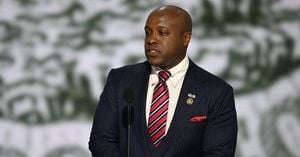The legal and political drama surrounding former Philippine President Rodrigo Duterte has taken a new turn, as debates intensify both in Manila and The Hague over his fate. On October 6, 2025, former Senator Antonio “Sonny” Trillanes IV publicly lambasted a Philippine Senate resolution that urges the International Criminal Court (ICC) to place Duterte under house arrest. Trillanes, a long-time critic of Duterte, dismissed the move as a transparent attempt to curry favor with the Duterte family and shore up political alliances ahead of the 2028 elections.
"Makikita niyo na tama lang talaga sa ICC natin dinala ‘yung kaso kasi dito makita niyo itong mga senador e takot o kaya sumisipsip sa mga Duterte hanggang ngayon," Trillanes told The Newsmaker, translated as, "You can see it was right to bring the case to the ICC because here you see these senators are either afraid of or sucking up to the Dutertes even now." His words underscore a broader frustration among Duterte’s critics that domestic mechanisms for accountability remain weak, especially when powerful political families are involved.
The Senate’s resolution, authored by Senator Alan Peter Cayetano and passed with 15 affirmative votes, appeals to the ICC for Duterte’s house arrest on humanitarian grounds. But Trillanes wasn’t having it. He branded the measure “useless” and “sipsip,” a Filipino term for sycophancy, arguing that it was meant to win the good graces of Vice President Sara Duterte—Rodrigo Duterte’s daughter—and to pave the way for future political deals. "The resolution holds no influence over ICC judges and is merely a show of loyalty," Trillanes insisted, pointing out that the real levers of justice now lie outside Philippine borders.
For context, Trillanes first filed the case against Duterte before the ICC in 2017, citing crimes against humanity linked to the administration’s notorious anti-drug campaign, which left thousands dead. The campaign, which Duterte defended as a necessary crackdown on illegal drugs, has been widely condemned by human rights organizations worldwide. According to Trillanes, the Senate’s recent actions only highlight why international oversight is crucial. “This underscores the importance of ICC involvement in investigating Duterte’s bloody drug war,” he emphasized.
Rumors have swirled around Duterte’s health and his detention status, with some suggesting Trillanes had visited Duterte in The Hague and that the former president’s health was deteriorating. Trillanes flatly denied both claims, calling them distractions from the main issue: accountability for the deaths that occurred during Duterte’s presidency.
Meanwhile, developments at the ICC are moving at a brisk pace. On September 29, 2025, ICC deputy prosecutor Mame Mandiaye Niang filed a document projecting that the case against Duterte would proceed to the confirmation of charges hearing "sooner than previous cases" before the court, as reported by multiple sources. Although the Pre-Trial Chamber I had postponed the hearing originally scheduled for September 23, 2025, Niang expressed confidence that it would take place in the coming months. The reasons for this optimism were redacted in the public version of the filing, but the message was clear: the ICC is not letting this case languish.
Duterte’s first appearance before the ICC tribunal took place on March 14, 2025, only days after his arrest in the Philippines and subsequent transfer to the ICC Detention Center in The Hague. Since then, his legal team, led by defense counsel Nicholas Kaufman, has mounted a series of challenges. Most notably, they argued that Duterte was unfit to stand trial and sought to terminate the proceedings. However, Niang countered that the defense had waited five months after Duterte’s initial appearance to raise this issue, which he described as an unnecessary delay tactic.
Niang further pointed out that Duterte had been actively instructing his lawyers to file various pleadings—including a challenge to the ICC’s jurisdiction and a motion to disqualify two of the three pre-trial judges—during those five months. These actions, Niang argued, directly contradict the claim that Duterte has been unfit to stand trial since March. "Duterte, if granted interim release, would be a flight risk, is likely to interfere with the proceedings, and may commit further crimes," Niang wrote, making the prosecution’s position clear.
The defense’s request for interim release was also met with strong opposition from the Office of the Public Counsel for Victims (OPCV), which represents those affected by Duterte’s anti-drug campaign. The OPCV stated that allowing interim release "would become unreasonably cumbersome and undoubtedly add extensive delays and disproportionate costs." They emphasized, "Mr. Duterte is detained for cogent reasons in accordance with the criteria set out in the applicable articles and rules (or statutory instruments). These reasons have been laid out in detail by both the Prosecution and the OPCV. None of these reasons has changed. There thus exists no basis for the Chamber to release Mr. Duterte pending the confirmation of charges against him."
As the legal wrangling continues, the political stakes in the Philippines remain high. The Senate’s resolution, while symbolic, has stirred debate about the limits of domestic influence over international legal processes. Some observers see it as a last-ditch effort by Duterte’s allies to shape the narrative and perhaps soften the blow of an impending ICC trial. Others, including Trillanes, view it as evidence that the old political order is unwilling to confront its own legacy.
For many Filipinos, the case has become a litmus test for the country’s commitment to human rights and the rule of law. The anti-drug campaign, which Duterte once described as a war that would be "as relentless and chilling as on the day it began," left a deep and painful mark on the nation. International human rights watchdogs estimate that thousands were killed, often in circumstances that raised serious questions about due process and police conduct.
Now, with the ICC proceedings moving forward and the prospect of a confirmation of charges hearing looming, the world is watching to see whether justice will be served—and whether the Philippines will reckon with one of the most controversial chapters in its recent history. The debate over Duterte’s fate is no longer just a legal or political matter; it’s a test of accountability on the international stage.
As October 2025 unfolds, both supporters and critics of Duterte are bracing for what comes next. The outcome of the ICC proceedings could have far-reaching implications, not just for Duterte and his family, but for the broader struggle over justice, impunity, and political power in the Philippines. For now, the story remains unfinished, but the signals from The Hague suggest that answers—whatever they may be—are coming sooner rather than later.




